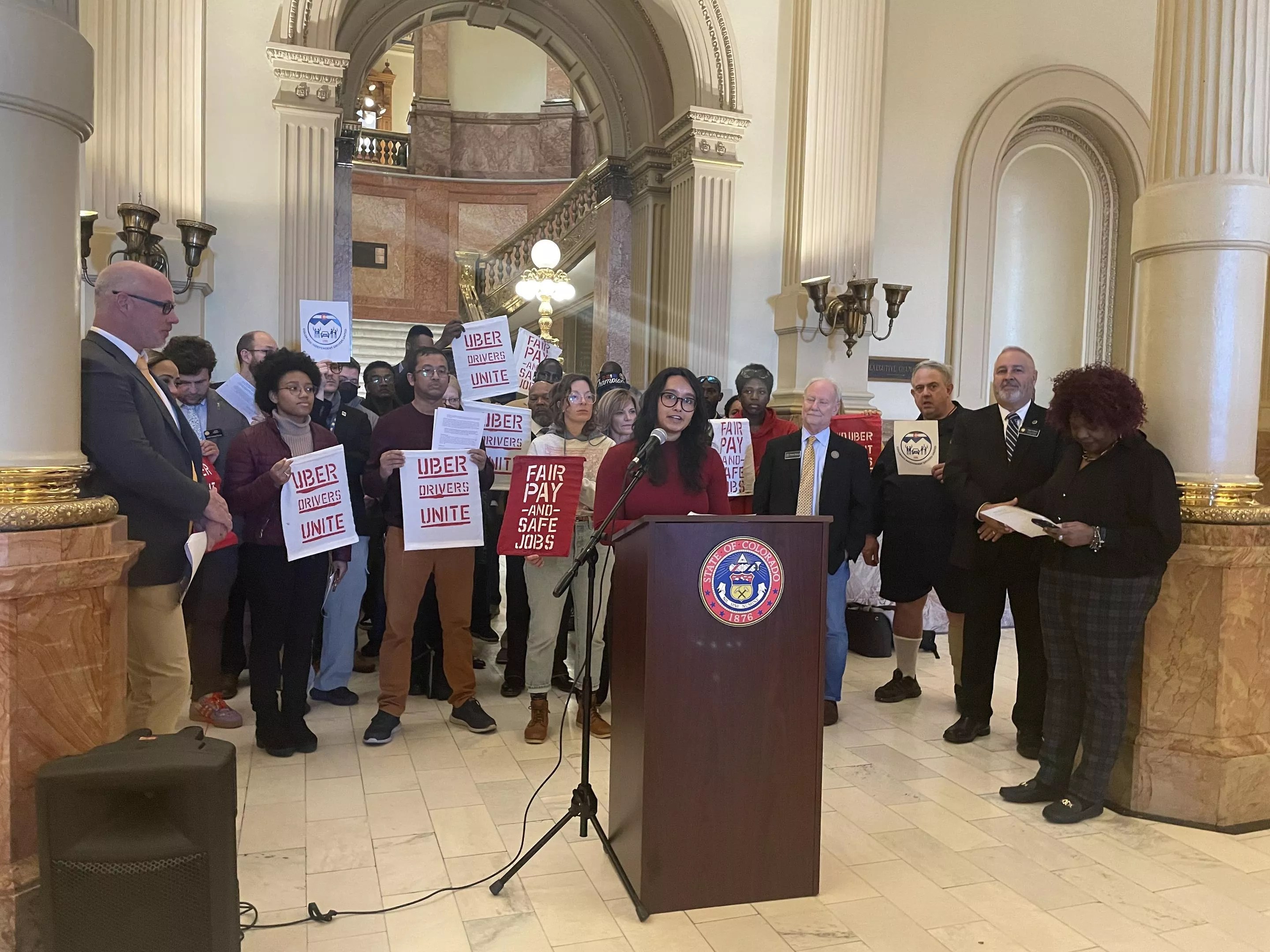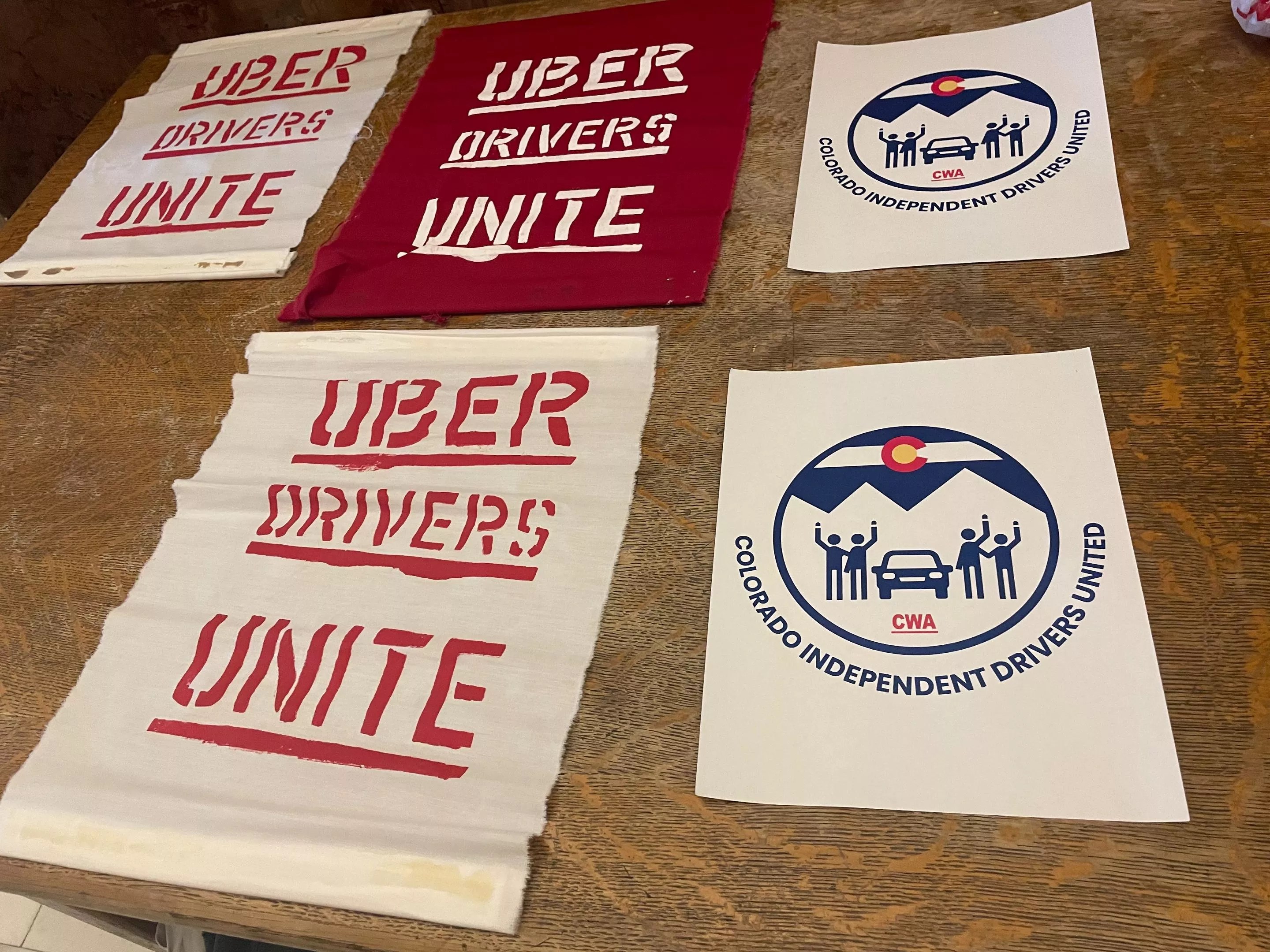
Catie Cheshire

Audio By Carbonatix
Colorado’s rideshare drivers have put in a lot of work over the past year – not just on the streets, delivering people and items where they need to go, but also in the Colorado Legislature. They want legislation that would require big rideshare companies like Uber and Lyft to be more transparent about their business with the state, consumers and drivers – who only earn about 14 percent of what riders pay, according to new research.
While a measure that changed fee-setting regulations to allow for competitors to rideshare giants passed last year, a Gig Work Transparency bill that would have allowed drivers and customers to know how much drivers make for each trip failed. Now the idea is back, with two bills aimed at transparency for rideshare drivers hitting the legislature this week. One, Transportation Network Company Transparency, or SB24-075, is sponsored by state Senator Kevin Priola – who actually voted to kill the transparency bill in the Senate Finance Committee last year.
“What I saw in that discussion is there were a lot of areas where there was agreement, and there were a lot of areas where there could be more common ground found if there was enough time,” Priola said at a rally for the two bills on February 20. “My commitment to the sponsors after that bill died was to get out early and start working. We started our conversations in July.”
Over the summer and fall, Priola and his bill’s other sponsors – Senator Robert Rodriguez and Representative Jennifer Bacon – held meetings with rideshare companies and drivers alike. The result is a bill that Priola says has a much better chance of passing, though he expects there will be changes as it makes its way through the legislature.
Colorado Independent Drivers United – a union of rideshare workers vying for better conditions for drivers in the state – has pushed for transparency on driver pay, trip distance and driver deactivations, which they say occur randomly and lead to drivers unfairly losing their livelihood.
The two proposals address those concerns but split the issue between transportation network companies (TNCs) – those that move people, like Uber and Lyft – and delivery network companies (DNCs) like DoorDash, that move items or food. “I felt like it’s better to simplify it by having each bill focus within its specific area,” Priola said.
He tells Westword that there were many discussions over details leading to the way the TNCs bill looks now. “I think through all the discussion, the companies realized, yeah, the drivers have legitimate concerns, we can see that,” Priola says. “But then the folks representing the drivers also realized there’s a good reason why they are set up this way.”
The bill would require TNCs to develop a clear, reasonable driver deactivation policy and disclose it to drivers by May 2025; companies must have “fair, objective and reasonable” reasons for deactivation and for reconsideration if drivers choose to appeal their deactivation.
Shoeb Babu, a CIDU member and longtime Uber and Lyft driver who spoke at the February 20 rally, is currently banned from driving for Lyft after he swerved to avoid a crash after another vehicle blew through a stop sign. He was banned simply because his rider reported that they had almost gotten in a crash, even though the accident would not have been Babu’s fault. On Uber, where he can still work, he has over 2,200 rides completed and a 4.98 rating.
Still, Babu found himself in Denver Small Claims Court with Lyft, trying to get compensation for lost income because of the deactivation. His hope is that with the Transportation Network Company Transparency bill, others won’t have to resort to taking legal action.

Drivers for Uber and Lyft want more transparency.
Catie Cheshire
“As an American, I’m asking for my basic rights,” Babu says. An immigrant from Bangladesh, he became an official citizen two weeks ago.
Along with a requirement to work with drivers like Babu who believe they have been unfairly deactivated, the Senate bill requires disclosures to the state about the number of rides taken, ride distances and durations, starting and ending zip codes, how much time people spend on the apps, and consumer payments including tips. Those disclosures and others would all become public record.
Additionally, the bill would require that when companies send ride requests to drivers, the requests disclose the distance and direction from the driver’s location, the duration of the ride, how much the customer will pay, the money the driver stands to make before the tip, and the tip amount if the customer had already indicated it.
Companies would also have to tell customers how much of what they’re charged goes to the driver.
“Being able to open the app at any time of day, any day of the week, provides great flexibility to drivers and allows them to create their own hours,” Priola said at the rally. “However, flexibility is most meaningful when drivers have a choice in their work.”
Bacon concurred, adding that knowledge is power. Her district includes the airport, where many rideshare drivers wind up during the day.
At a hearing for the bill on February 20, Jon Walker, Lyft’s senior policy manager, said that the company hasn’t been able to learn enough about the deactivation elements of the bill to support it, and already has concerns about the amount of data that would be required to be disclosed under the transparency sections.
“We have, as I mentioned, met with the bill sponsors for months to get that portion into a palatable form,” Walker said. “In contrast, the deactivation appeal process regulation has not been shown to us.”
Representative Stephanie Vigil, who’s sponsoring the DNC bill, HB24-1129 Protections for Delivery Network Company Drivers, is a delivery driver, the first gig driver elected to the legislature.
“This is an emerging industry,” Vigil said at the rally. “There’s a lot that’s going to have to keep being revisited over the years, but we really want to get a solid baseline in place about what is fair for drivers as they make decisions about their work, what is fair for consumers to know about where their money is going, and how we can ensure that this industry doesn’t harm public health and safety. I think if we get those things right, we’re headed in the right direction.”
Vigil’s bill, co-sponsored by Representative Javier Mabrey and Senator Nick Hinrichsen, is very similar to the Senate version for TNC drivers when it comes to disclosures and deactivations, but with a few additions specific to DNCs.
For example, delivery drivers must always stop at two addresses: one to get the food or items they will deliver, and one to drop them off. So the bill specifies that drivers should be provided the location of both stops when they’re offered a task.
The House bill would give drivers 120 seconds to decide if they will accept a task (they currently have six seconds) whereas the Senate bill only asks for 60 seconds. Priola says that number was put in the Senate bill after rideshare companies expressed worries that 120 seconds could lead to a cascade of service delays.
At the rally, Mabrey said the House bill is asking for 120 seconds in order to improve safety; drivers would have time to pull over and accept a task rather than accepting while on the move.
“This bill is about simple transparency,” Mabrey added. “We’re asking some of the wealthiest, most sophisticated companies in this country to just provide some transparency to their workers. Flexibility without transparency is a lie.”
The House bill has nearly the same provisions about deactivation and disclosures as the Senate bill. The disclosures that would be made to the state about driver statistics are key, advocates say, because currently much of that information is unknown.
Samantha Dalal, a Ph.D. student at the University of Colorado, is part of the Workers’ Algorithm Observatory – a cross-institutional research organization at CU, Princeton University and Pennsylvania State University. Through a partnership with CIDU, Dalal has been able to collect data on over 13,000 gig driver trips in the state.
According to the data, base pay for drivers has decreased from about $1.50 per mile in 2019 to around 50 cents per mile today; only about 14 percent of what customers pay is going to drivers. With full disclosure of all trips in the state, she says, the information could be even more accurate and useful.
“Drivers shouldn’t have to rely on independent researchers to go out and create these expensive tools and services in order to get this aggregate information we need,” Dalal said at the rally. “Transparency is crucial for building trust and ensuring fair compensation for all parties involved.”
SB-075 was heard in the Senate Business, Labor, & Technology Committee on February 20, and HB-1129 will be heard in the House Business Affairs & Labor Committee on February 22.
“They have served our communities very well,” Vigil said of the drivers. “They deserve the same from all of us. Let’s get this thing passed.”